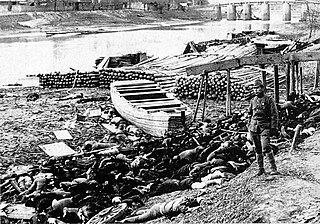Nanjing Incident may refer to:

Nanjing, alternatively romanized as Nanking, is the capital of Jiangsu province of the People's Republic of China. It is a sub-provincial city, and a megacity. The city has 11 districts, an administrative area of 6,600 km2 (2,500 sq mi), and a population of 9,423,400 as of 2021. Situated in the Yangtze River Delta region, Nanjing has a prominent place in Chinese history and culture, having served as the capital of various Chinese dynasties, kingdoms and republican governments dating from the 3rd century to 1949, and has thus long been a major center of culture, education, research, politics, economy, transport networks and tourism, being the home to one of the world's largest inland ports. The city is also one of the fifteen sub-provincial cities in the People's Republic of China's administrative structure, enjoying jurisdictional and economic autonomy only slightly less than that of a province. Nanjing has been ranked seventh in the evaluation of "Cities with Strongest Comprehensive Strength" issued by the National Statistics Bureau, and second in the evaluation of cities with most sustainable development potential in the Yangtze River Delta. It has also been awarded the title of 2008 Habitat Scroll of Honor of China, Special UN Habitat Scroll of Honor Award and National Civilized City. Nanjing is also considered a Beta city classification, together with Chongqing, Hangzhou and Tianjin by the Globalization and World Cities Research Network, and ranked as one of the world's top 100 cities in the Global Financial Centres Index.

The Nanjing Massacre or the Rape of Nanjing was the mass murder of Chinese civilians in Nanjing, the capital of the Republic of China, immediately after the Battle of Nanking in the Second Sino-Japanese War, by the Imperial Japanese Army. Beginning on December 13, 1937, the massacre lasted six weeks. The perpetrators also committed other war crimes such as mass rape, looting, and arson. The massacre is considered to be one of the worst wartime atrocities.

The Xi'an Incident was a major Chinese political crisis from 12 to 26 December 1936. Chiang Kai-shek, leader of the Nationalist government of China, was placed under house arrest in the city of Xi'an by a Nationalist army he was there to review. Chiang's captors hoped to end the Chinese Civil War and confront Japanese imperial expansion into Chinese territory. After two weeks of intense negotiations between Chiang, his captors, and representatives of the Chinese Communist Party (CCP), Chiang was released with a verbal promise to end the civil war and put up a firmer resistance to Japan.
This article is concerned with the events that preceded World War II in Asia.

The Nanking Incident occurred in March 1927 during the capture of Nanjing by the National Revolutionary Army (NRA) in their Northern Expedition. Foreign warships bombarded the city to defend foreign residents against rioting and looting. Several ships were involved in the engagement, including vessels of the Royal Navy and the United States Navy. Marines and sailors were also landed for rescue operations including some 140 Dutch forces. Both Nationalist and Communist soldiers within the NRA participated in the rioting and looting of foreign-owned property in Nanjing.
Olympic Sports Center may refer to:
Union Theological Seminary may refer to:
Nanjing means "southern capital" and is the name of the current capital of Jiangsu Province and a former capital of China.
Japanese occupation government may refer to:

John Moore Allison was an American diplomat who served as the United States Ambassador to Japan from 1953 to 1957. From 1957 to 1958, he was Ambassador to Indonesia and from 1958 to 1960 to Czechoslovakia. In the 1960s and 1970s, he was a professor at the University of Hawaii.
Xuanwumen or Xuanwu Gate may refer to:
Nanjing Massacre denial is the denial of the fact that Imperial Japanese forces murdered hundreds of thousands of Chinese soldiers and civilians in the city of Nanjing during the Second Sino-Japanese War, an extremely controversial episode in the history of Sino-Japanese relations. Most historians accept the findings of the Tokyo tribunal with respect to the scope and nature of the atrocities which were committed by the Imperial Japanese Army after the Battle of Nanjing. In Japan, however, there has been a debate over the extent and nature of the massacre with some historians attempting to downplay or outright deny that the massacre took place.
The Historiography of the Nanjing Massacre is the representation of the events of the Nanjing Massacre as history, in various languages and cultural contexts, in the years since these events took place. This historiography is disparate and sometimes contested, owing to conflicting currents of Chinese and Japanese nationalist sentiment and national interest, as well as the fog of war.
Purple Mountain may refer to:
Taishan may refer to:

Nanjing University is a public university in Nanjing, Jiangsu, China. It is affiliated and sponsored by the Ministry of Education. The university is part of Project 211, Project 985, and the Double First-Class Construction.
The Republic of China may refer to:
Nanjing railway station (南京站) is one of the two main railway stations of Nanjing, Jiangsu.
Western Capital may refer to:
There have been several battles set in and around the city of Nanjing, China. Nanjing was previously named Jianye and Jiankang. During the 19th and 20th centuries, Nanking was a popular romanization of the name in European sources. The Battle of Nanjing may refer to: